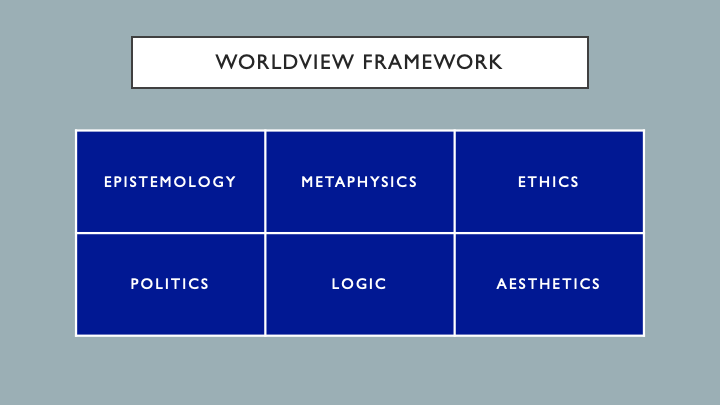What is a Worldview?
There are literally as many worldviews as there are people. But we usually group similar worldviews into specific schools of thought. There have been dozens of influential religious worldviews. Within philosophical circles, the Ancient Greeks had several schools of philosophy built on Platonist, Aristotelian, Stoic, Epicurean, and Skeptic ideas. Enlightened Europeans had continental rationalists, British Empiricists, German idealists, and the existentialists. The post-industrial age ushered in American pragmatists and the logical positivists from the Vienna Circle. That last group was inspired by the revolution in physics from Albert Einstein. The revolution in biology after Charles Darwin, of course, inspired some dangerously ignorant eugenicists and social Darwinists when his theories were first being grasped. But thankfully those ideas have been thoroughly debunked and refuted. They were so repugnant, however, that most philosophers have kept their distance from Darwin ever since. But now, with a much fuller understanding of the modern synthesis, the extended evolutionary synthesis, multilevel selection theory, and the major transitions in the cooperation of life, it's time to help complete the Darwinian revolution by developing a carefully considered evolutionary philosophy as the basis for a durable worldview.
Before we can do that, and before we can compare and contrast all the worldviews listed above and elsewhere, we need a good definition that tells us what the elements of a worldview are. Among the many resources on this subject, four of the best books and articles I found on this subject (1, 2, 3, 4) list several different, although often overlapping, elements of what a worldview must include. I would summarise these as saying that a worldview ought to do the following 19 different things:
Before we can do that, and before we can compare and contrast all the worldviews listed above and elsewhere, we need a good definition that tells us what the elements of a worldview are. Among the many resources on this subject, four of the best books and articles I found on this subject (1, 2, 3, 4) list several different, although often overlapping, elements of what a worldview must include. I would summarise these as saying that a worldview ought to do the following 19 different things:
|
…explain the nature of the world; give us direction; tell us what to value; tell us how to act; explain what we can know; provide consistency and coherence to the story we tell ourselves; incorporate facts that we encounter; explain how things function; tell us why we are the way we are; yield insights into our feelings and emotions; tell us how to organise politically; help us choose future paths; uncover the origins of the universe and life itself; give us meaning and purpose; answer questions about gods and other mysteries; tell us what is good, what is truth, and what is beauty; help us feel less terrified of death; shed light on our joys and sorrows; and guide us through our darker hours.
|
We have ideas about all of these, either consciously or subconsciously. It’s possible that they can be explicitly known and explored, but more commonly they are a bundle of hidden assumptions tied together by a few professed beliefs you’ve either grown up with or adopted later in life. They can be passively absorbed from the society around you, or actively built through personal research and rational reflection. The elements are often interwoven and reinforce one another, but sometimes our beliefs contradict each other. It’s hard to dig in and examine this, though, unless you have a good framework to use to consistently analyse what's in each worldview.
What could such a framework be? In my first edition of Evolutionary Philosophy, I attempted to construct a worldview through the use of a simple list of 10 tenets, and then by using a more comprehensive set of questions on how to Know Thyself. Those were both non-traditional methods for philosophers, but after blogging about 100 philosophical thought experiments and feeling my own worldview shift during that process, it became clear to me that the best way to present the hidden structure behind all of the elements of my worldview was by using the six main academic branches of philosophy: epistemology, metaphysics, logic, ethics, political philosophy, and aesthetics. These branches originate from very basic and universal questions: What do I know? Where are we? How can I be sure? What is good? How do we act together? What is the beauty that gives us meaning and hope to carry on? Providing answers to these questions will meet the 19 requirements for a worldview I listed above.
This makes sense when you look at the history of philosophy. Long before there was science, philosophy was the field where people went to study unknown things in the world. Aristotle wrote much about biological classifications. Before that, the pre-Socratics wrote about atoms and the five basic elements of the universe—these were essentially their versions of physics and chemistry. Even Isaac Newton’s landmark book was called Mathematical Principles of Natural Philosophy.
But once the scientific method was defined during the Renaissance and Enlightenment periods, basically any time a subject became understood well enough to be tested empirically, these pursuits were then split off into their own discipline. This is why some people have characterised the history of philosophy as one that spawns science. And so now, philosophers are left with only the most difficult things that we can’t quite wrap our arms around to measure and be certain about. That’s where radical choices can still made about what to believe in or not. In other words, this is where we can still find and define all of our differing worldviews.
What is the Evolutionary Philosophy Worldview?
During the first 10 years of writing about this subject, I produced two summaries that best give an overview of the evolutionary philosophy worldview:
What I Learned From 100 Philosophy Thought Experiments
What Can Evolution Teach Us About Humanism?
Read through either of those for the 30-minute version of evolutionary philosophy with lots of links for further information.
Boiling those down into a single chart, here is the summary slide from a talk I gave about evolutionary philosophy:
What I Learned From 100 Philosophy Thought Experiments
What Can Evolution Teach Us About Humanism?
Read through either of those for the 30-minute version of evolutionary philosophy with lots of links for further information.
Boiling those down into a single chart, here is the summary slide from a talk I gave about evolutionary philosophy:
If you want something even pithier, you could ask for a "standing on one foot summary" of evolutionary philosophy. (For other "one-foot" examples, follow these links for Judaism, Objectivism, and Sociobiology.) If necessary, I would give mine as:
|
“Life emerged when chemicals became organised in such a way that they acted to survive and replicate. More robust ways of doing this have been naturally preserved ever since. Everything else is commentary."
|
Further Reading
More details for each of the 6 branches of this worldview can be found in the menu bar above. But for more general articles about the evolutionary philosophy worldview, here are some additional posts:
- North East Humanists — Beliefs and Values
- An Evolutionary Perspective on the Meaning of Life
- An Atheist's Place in the Big Tent of Sacred Naturalism — an essay published at Patheos
- Steps Anyone Can Take to Unify and Change the World — an essay published at Patheos
- An Evolutionary Imagination for Sacred Naturalism — Evolutionary writer, professor, and psychologist Alice Andrews quotes me in her profile for the Evolution Institute.
- Meaning in Life as Being Part of Cosmic Evolution — Philosopher John Messerly discusses the comments I sent him about his book, wherein I describe my own thoughts on the meaning of life.
- In Defence of Humanism
- Do Philosophers Vacation or Holiday?
- My Resolution
- 9 Tips for the Future
- Is Philosophy Dead?
- Eutopian Dreams for Olatopias
- Off to Explore What Else Philosophical Work Could Be
- A Brief Interlude, Featuring Lawrence Rifkin
- Top 12 Favourite Quotes from Richard Dawkins
- A Small Philosophy Gift for the Holidays
Subscribe to Help Shape This Evolution
© 2012 Ed Gibney


